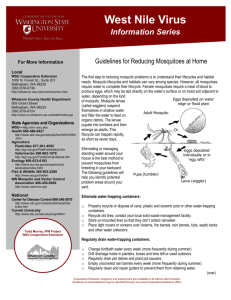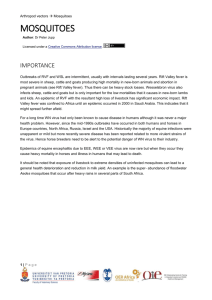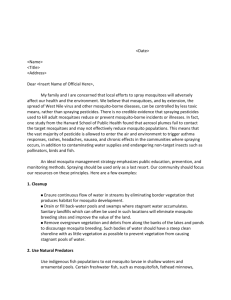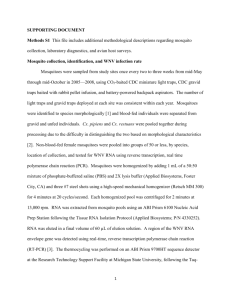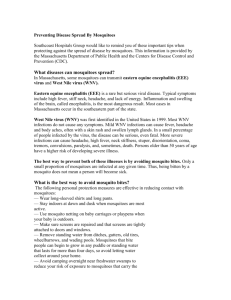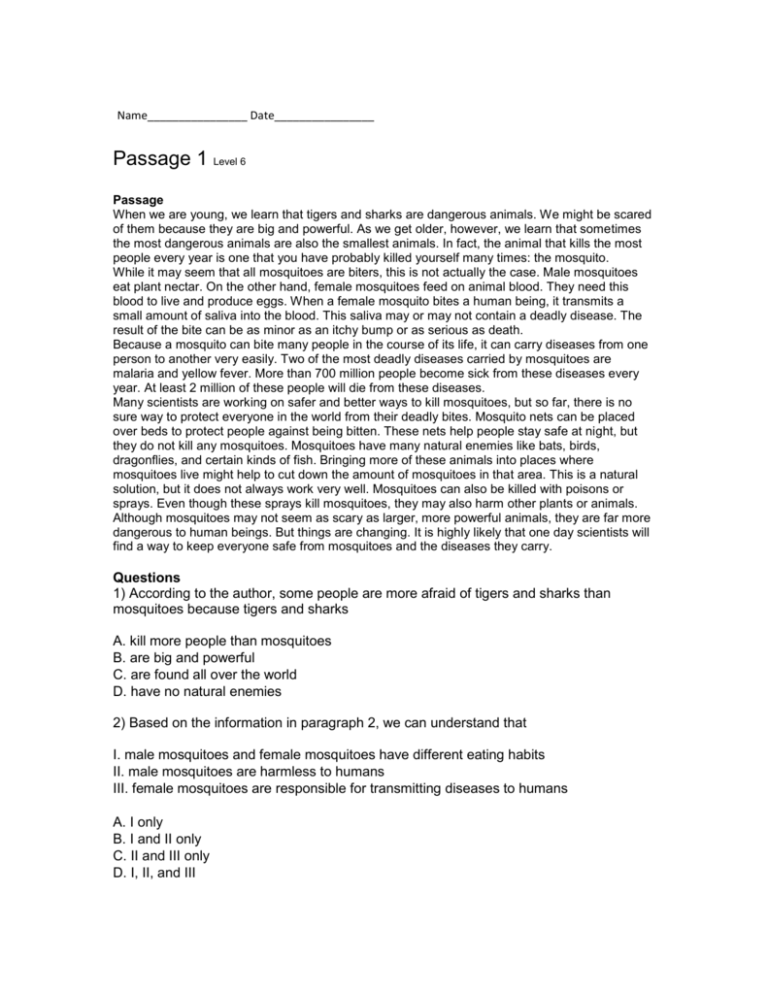
Name________________ Date________________
Passage 1 Level 6
Passage
When we are young, we learn that tigers and sharks are dangerous animals. We might be scared
of them because they are big and powerful. As we get older, however, we learn that sometimes
the most dangerous animals are also the smallest animals. In fact, the animal that kills the most
people every year is one that you have probably killed yourself many times: the mosquito.
While it may seem that all mosquitoes are biters, this is not actually the case. Male mosquitoes
eat plant nectar. On the other hand, female mosquitoes feed on animal blood. They need this
blood to live and produce eggs. When a female mosquito bites a human being, it transmits a
small amount of saliva into the blood. This saliva may or may not contain a deadly disease. The
result of the bite can be as minor as an itchy bump or as serious as death.
Because a mosquito can bite many people in the course of its life, it can carry diseases from one
person to another very easily. Two of the most deadly diseases carried by mosquitoes are
malaria and yellow fever. More than 700 million people become sick from these diseases every
year. At least 2 million of these people will die from these diseases.
Many scientists are working on safer and better ways to kill mosquitoes, but so far, there is no
sure way to protect everyone in the world from their deadly bites. Mosquito nets can be placed
over beds to protect people against being bitten. These nets help people stay safe at night, but
they do not kill any mosquitoes. Mosquitoes have many natural enemies like bats, birds,
dragonflies, and certain kinds of fish. Bringing more of these animals into places where
mosquitoes live might help to cut down the amount of mosquitoes in that area. This is a natural
solution, but it does not always work very well. Mosquitoes can also be killed with poisons or
sprays. Even though these sprays kill mosquitoes, they may also harm other plants or animals.
Although mosquitoes may not seem as scary as larger, more powerful animals, they are far more
dangerous to human beings. But things are changing. It is highly likely that one day scientists will
find a way to keep everyone safe from mosquitoes and the diseases they carry.
Questions
1) According to the author, some people are more afraid of tigers and sharks than
mosquitoes because tigers and sharks
A. kill more people than mosquitoes
B. are big and powerful
C. are found all over the world
D. have no natural enemies
2) Based on the information in paragraph 2, we can understand that
I. male mosquitoes and female mosquitoes have different eating habits
II. male mosquitoes are harmless to humans
III. female mosquitoes are responsible for transmitting diseases to humans
A. I only
B. I and II only
C. II and III only
D. I, II, and III
3) In paragraph 2 the author writes, "This saliva may or may not contain a deadly
disease." The purpose of this statement is to
A. oppose a previous argument
B. question an upcoming conclusion
C. confirm a hypothesis
D. support a later statement
4) As used in paragraph 2, minor most nearly means
A. insignificant
B. deadly
C. frustrating
D. dangerous
5) Based on information in paragraph 3, it can be understood that if you get sick with
malaria or yellow fever, your chances of survival are
A. terrible
B. mediocre
C. good
D. excellent
6) It can be understood that the introduction of dragonflies might reduce the number of
flies in a given area because dragonflies
A. work together with mosquitoes
B. kill mosquitoes
C. cannot be killed by poisons or sprays
D. attract bats
7) Which of the following best summarizes the information in paragraph 4?
A. Mosquito nets provide adequate protection from deadly mosquitoes.
B. Poisons and sprays provide adequate protection from deadly mosquitoes.
C. The introduction of the mosquito's natural enemies provides adequate protection from
deadly mosquitoes.
D. There is no perfect solution to the mosquito problem.
8) Which of the following words best describes the author's overall attitude towards the
prospect of solving the mosquito problem?
A. despondent, meaning hopeless or dejected
B. exasperated, meaning extremely irritated or annoyed
C. equivocal, meaning doubtful or uncertain
D. optimistic, meaning hopeful or taking a favourable view
Answers and Explanations
1) B
In the first paragraph the author says, "We might be scared of them because they are
big and powerful." In the last paragraph, the author says that we might be more afraid of
tigers and sharks than we are of mosquitoes because tigers and sharks are "larger, and
more powerful." This lets us know that (B) is correct. In paragraph 1, the author tells us
that of all animals, the mosquito "kills the most people every year." This eliminates (A).
The passage does not contain information to support choices (C) and (D). Therefore
they are incorrect.
2) D
In paragraph 2 the author writes, "Male mosquitoes eat plant nectar. On the other hand,
female mosquitoes feed on animal blood." Using this information, we can understand
that male mosquitoes and female mosquitoes have different eating habits. This supports
option (I). In paragraph 2 the author writes, "Male mosquitoes eat plant nectar. On the
other hand, female mosquitoes feed on animal blood. They need this blood to live and
produce eggs. When a female mosquito bites a human being, it transmits a small
amount of saliva into the blood. This saliva may or may not contain a deadly disease."
Since male mosquitoes eat plant nectar (and not animal blood), and it is the bite that
causes the transmission of diseases, we can understand that male mosquitoes do not
bite humans. Therefore they are harmless to humans. This supports option (II). In
paragraph 2 the author writes, "Male mosquitoes eat plant nectar. On the other hand,
female mosquitoes feed on animal blood. They need this blood to live and produce eggs.
When a female mosquito bites a human being, it transmits a small amount of saliva into
the blood. This saliva may or may not contain a deadly disease." Since male mosquitoes
eat plant nectar (and not animal blood), and it is the bite that causes the transmission of
diseases, we can understand that female mosquitoes are responsible for transmitting
diseases to humans. This supports option (III). Therefore (D) is correct.
3) D
To answer this question correctly, it helps to use context. At the end of paragraph 2 the
author writes, "This saliva may or may not contain a deadly disease." In the next
sentence the author writes, "The result of the bite can be as minor as an itchy bump or
as serious as death." Using this information, we can understand that the reason why the
result of the bite can be as minor as an itchy bump or as serious as death is because the
mosquito's saliva may or may not contain a deadly disease. This lets us know that the
purpose of the statement in question is to support a later statement, which, in this case,
is the next sentence. Choice (D) is correct. The passage does not provide information to
support choices (A), (B). and (C). Therefore they are incorrect.
4) A
minor (adjective): relatively small in size, quantity, or degree.
In paragraph 2, the author says that when a mosquito bites a person, “The result of the
bite can be as minor as an itchy bump or as serious as death.” Here, the author
contrasts an itchy bump with death. An itchy bump is not very serious when compared to
death. An itchy bump is a small, insignificant problem, while death is aptly described as
"serious." This makes (A) the correct choice. Although itchy bumps can be frustrating,
this is not as good a contrast for "serious" as insignificant. Therefore (C) is incorrect. (B)
and (D) are incorrect because the author contrasts the itchy bumps with deadly ones.
The author means to show that an itchy bump is harmless, not deadly or dangerous. ©
Copyright EnglishForEveryone.Org, 2012. All rights reserved.
5) D
At the end of paragraph 3 the author writes, "More than 700 million people become sick
from these diseases every year. At least 2 million of these people will die from these
diseases." This lets us know that of the 700 million people who become sick, only
around 2 million do not survive. Because 2 million is an extremely small percentage of
700 million (2/700 or .002%), we can understand that if you get sick with malaria or
yellow fever, your chances of survival are excellent. This means (D) is correct. The
passage does not provide information to support choices (A), (B). and (C). Therefore
they are incorrect.
6) B
In paragraph 4, the author says that, “Mosquitoes have many natural enemies like bats,
birds, dragonflies, and certain kinds of fish. Bringing more of these animals into places
where mosquitoes live might help to cut down the amount of mosquitoes in that area.”
(B) is the only choice that uses information supported by the passage to provide a
reason why dragonflies would reduce (or make less) the number of mosquitoes in a
given area. Therefore it is correct. The passage does not provide information to support
choices (A), (C), and (D). Therefore they are incorrect.
7) D
In paragraph 4, the author writes, "Many scientists are working on safer and better ways
to kill mosquitoes, but so far, there is no sure way to protect everyone in the world from
their deadly bites." The author continues to discuss possible solutions and their
respective drawbacks. This lets us know there is not perfect solution to the mosquito
problem. Choice (D) is correct. The passage does not provide information to support
choices (A), (B), and (C). Therefore they are incorrect.
8) D
In the final paragraph the author concludes the passage by saying, "But things are changing. It is
highly likely that one day scientists will find a way to keep everyone safe from mosquitoes and
the diseases they carry." This lets us know that although the problem may look grim now, there is
a good chance that scientists will be able to solve it in the future. Thus, the author's attitude
towards the prospect of solving the mosquito problem can best be described as optimistic.
Therefore (D) is correct. Despondent and exasperated are too negative to accurately describe the
author's attitude. Therefore choices (A) and (B) are incorrect. The author does not express
uncertainty about the prospect of solving the mosquito problem. Therefore the author is not
equivocal. Choice (C) is incorrect.

